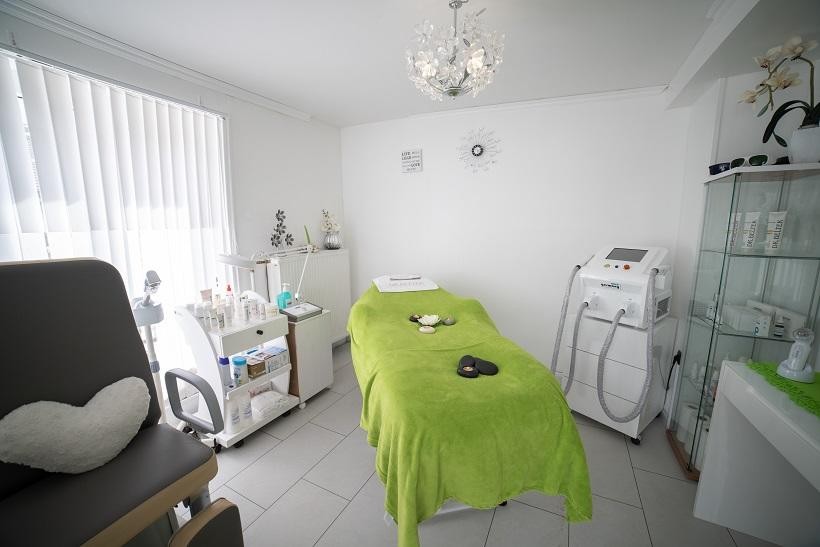Acute care programs are essential components of the healthcare system, providing regulatory oversight for facilities that treat patients experiencing acute illnesses, injuries, or disorders. These programs ensure that healthcare facilities meet specific standards of care and operate within federal and state regulations. The facilities under the purview of acute care programs are diverse, ranging from hospitals to specialized centers, all dedicated to providing immediate and short-term care for serious conditions.
 Acute care examination room showcasing patient table, medical equipment, and healthcare supplies. This image represents facilities regulated by acute care programs.
Acute care examination room showcasing patient table, medical equipment, and healthcare supplies. This image represents facilities regulated by acute care programs.
Types of Facilities Covered Under Acute Care Programs
Acute care programs extend their regulatory authority over a variety of healthcare facilities, each with a specific focus within the broader spectrum of acute care. Understanding these different types of facilities is crucial to grasping the comprehensive nature of Acute Care Program Definitions.
Ambulatory Surgery Centers (ASCs)
Ambulatory Surgery Centers, also known as Ambulatory Surgical Treatment Centers, are facilities primarily dedicated to providing surgical treatments to patients who do not require overnight hospitalization. These centers are designed for procedures that do not typically necessitate extended recovery periods. Governed by regulations such as O.C.G.A. § 31-7- 1(4)(c), ASCs focus on efficient and effective surgical care for patients who can return home the same day. They are not equipped for procedures requiring overnight stays or continuous care lasting 24 hours or more.
Community Mental Health Centers (CMHCs)
Community Mental Health Centers (CMHCs), defined under §410.2, play a vital role in providing accessible mental healthcare services. These centers offer a range of services, including:
- Outpatient Services: Specialized outpatient care for children, the elderly, individuals with chronic mental illnesses, and those transitioning from inpatient mental health facilities.
- 24/7 Emergency Care Services: Ensuring immediate access to mental health support during crises.
- Day Treatment and Partial Hospitalization: Structured programs for individuals needing more intensive care than traditional outpatient services but not full hospitalization.
- Screening for State Mental Health Facilities: Evaluating patients to determine the appropriateness of admission to state-run mental health facilities.
CMHCs must meet state licensing and certification requirements and dedicate a significant portion of their services (at least 40%) to individuals not eligible for Medicare benefits, ensuring care reaches a broad population.
Hospitals
Hospitals, within the context of acute care programs, are defined as facilities providing two or more beds, along with comprehensive services for examination, diagnosis, treatment, surgery, and maternity care. These facilities are designed for patients requiring care for 24 hours or longer. Hospitals are classified by regulatory bodies based on the scope of services they offer, including acute care hospitals, critical access hospitals, rehabilitation hospitals, and psychiatric hospitals, all falling under the umbrella of acute care program oversight.
Psychiatric Rehabilitation Treatment Facilities
Psychiatric Rehabilitation Treatment Facilities, sometimes referred to as Residential Mental Health Facilities, offer 24-hour care with a primary focus on diagnosing and treating psychiatric disorders in patients up to age 21. These specialized facilities aim to restore young patients to an optimal level of functioning through intensive and tailored treatment programs. Classified as a sub-type of “Specialized Hospitals,” these facilities address the unique mental health needs of children and youth within a residential setting.
Conclusion
In summary, the acute care program definition encompasses the regulatory framework overseeing a diverse set of healthcare facilities crucial for managing immediate and serious health conditions. These programs ensure quality of care, patient safety, and adherence to established standards across hospitals, ambulatory surgery centers, community mental health centers, and psychiatric rehabilitation facilities. Understanding the scope and function of acute care programs is vital for both healthcare providers and the public, as they are fundamental to maintaining a robust and reliable healthcare system for acute medical and mental health needs.
